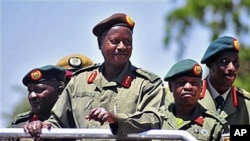Ugandan President Yoweri Museveni has been re-elected to another five-year term in office, extending a rule that began in 1986. Uganda's Electoral Commission reported that he secured the victory over leading opposition leader Kizza Besigye with 68 percent of the vote in a largely peaceful campaign that culminated February 18.
The United States applauds the Ugandan people for their participation in the election, the fourth since the return of multi-party polls in 1996. About 14 million people were registered to vote and eager to have their voices heard, so it was disappointing that polling stations appeared disorganized and many voters' names were missing from the registration lists. Many of these irregularities could have been avoided by appointing an independent and more representative Electoral Commission.
Nevertheless, we urge all parties to abide by the official results, refrain from violence and address all grievances through Uganda's independent judiciary. Democracy requires a commitment to the rule of law, freedom of speech and assembly, an independent press and civil society. We urge the Ugandan government to undertake the electoral and administrative reforms that will substantially improve future elections. This will strengthen the nation's commitment to both multi-party democracy and human rights for the next generation of Ugandan citizens.
More Electoral Reform Needed In Uganda

Yoweri Museveni has been re-elected to another 5-year term in office, extending a rule that began in 1986.















